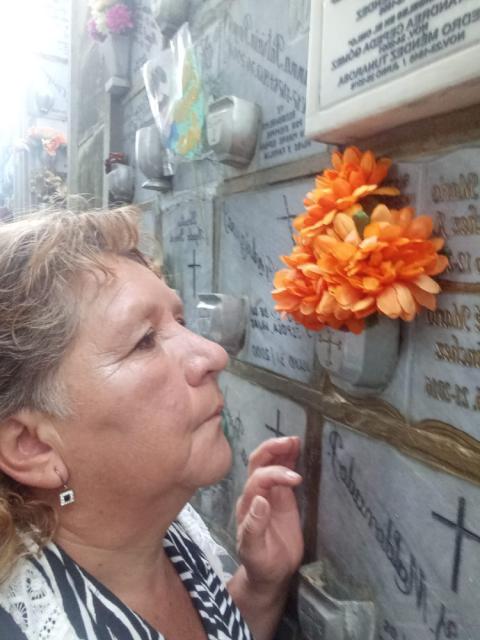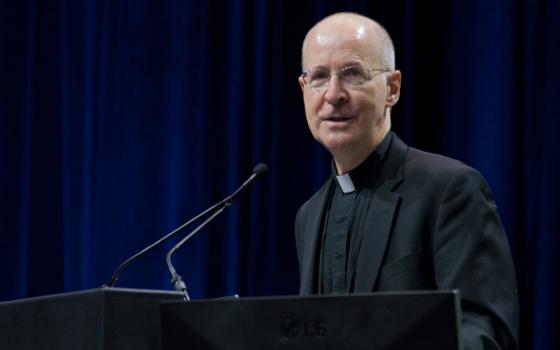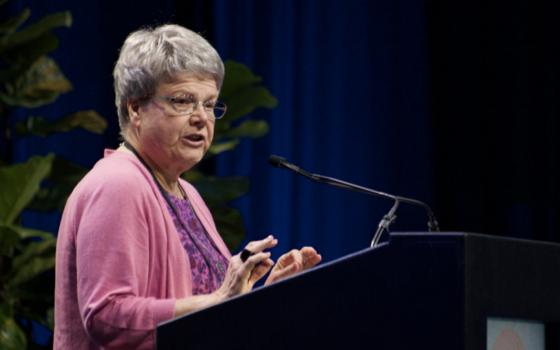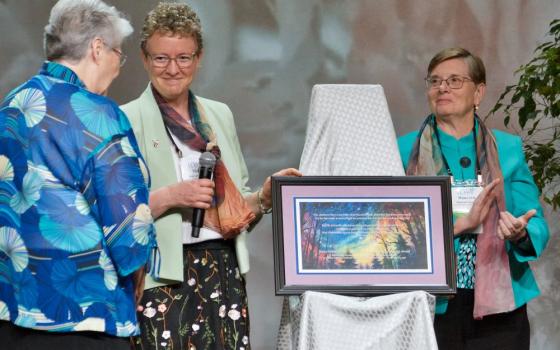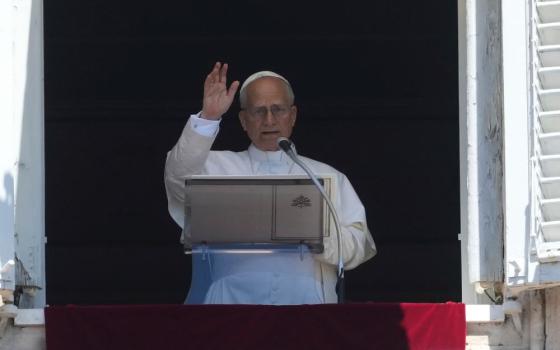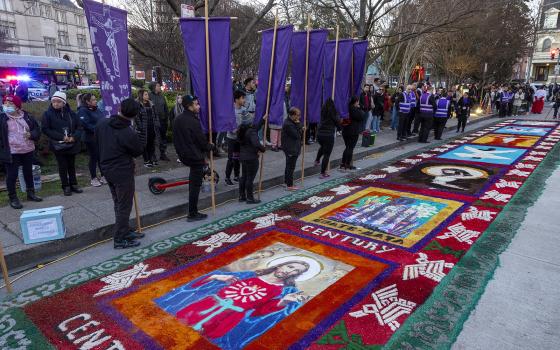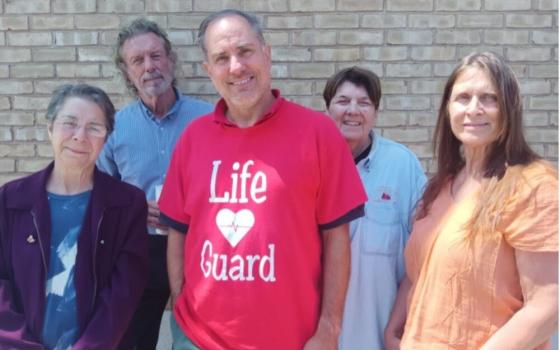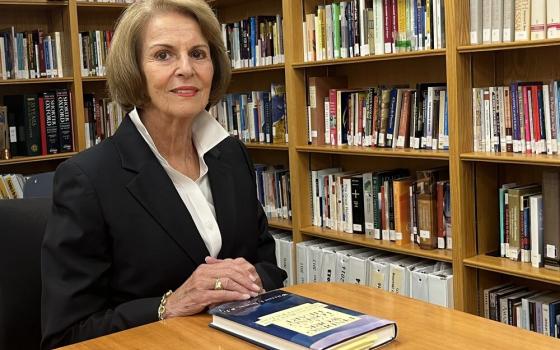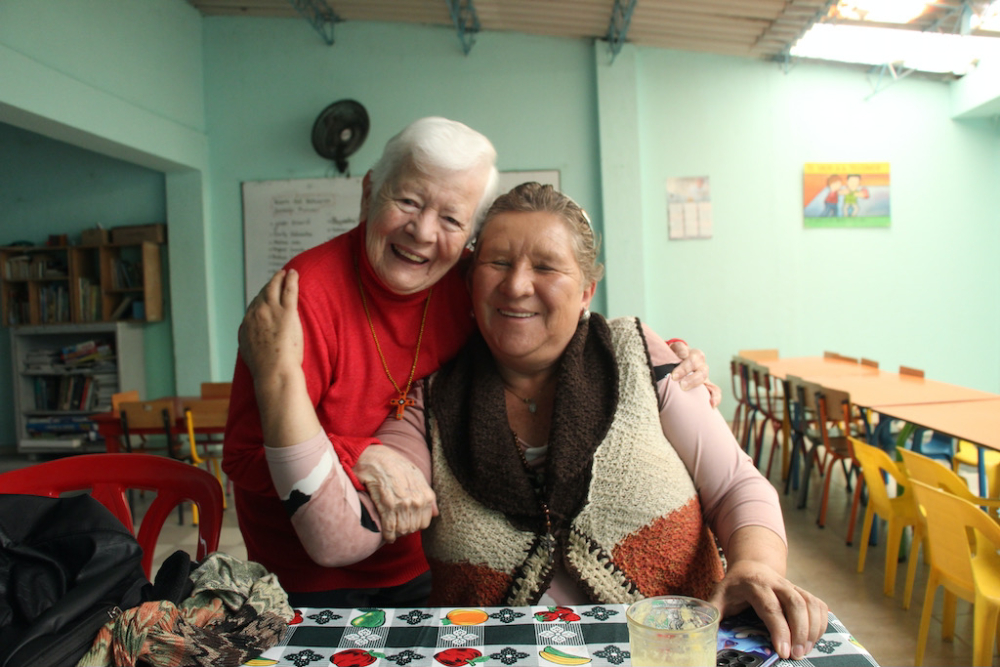
Sr. Maritze embraces Cecilia Arenas of the Mothers of Soacha, a longtime friend she calls "una gran luchadora" (a great fighter). (Tracy L. Barnett)
The El Pueblo Community Home in Soacha, Colombia, reverberates with preparations for the afternoon's performance. Children in traditional costumes practice their steps one more time while mothers adjust ruffled skirts and straighten miniature sombreros. Sr. Maritze Trigos Torres supervises as Sr. Teresita Cano prepares the afternoon meal.
But in a quiet corner, Cecilia Arenas of the Madres de Soacha begins to speak of another reality in this neighborhood on the outskirts of Bogotá. And that reality includes her journey from rage to healing — jumping from a plane in a parachute with a convicted murderer along the way.
Cecilia's youngest brother, Mario Alexander Arenas Garzón, was one of Colombia's thousands of "false positive" victims — civilians murdered by the Colombian military and dressed as guerrilla fighters to inflate body counts and claim government rewards. In 2008, soldiers lured the 32-year-old construction worker from Bogotá with promises of work, shot him and displayed his corpse as an enemy combatant. A soldier later confessed with cruel casualness: "That boy was a fool who lent himself for a false positive." Alex had joined thousands of young men, many from this same Soacha neighborhood, whose deaths exposed one of the Colombian military's darkest chapters.
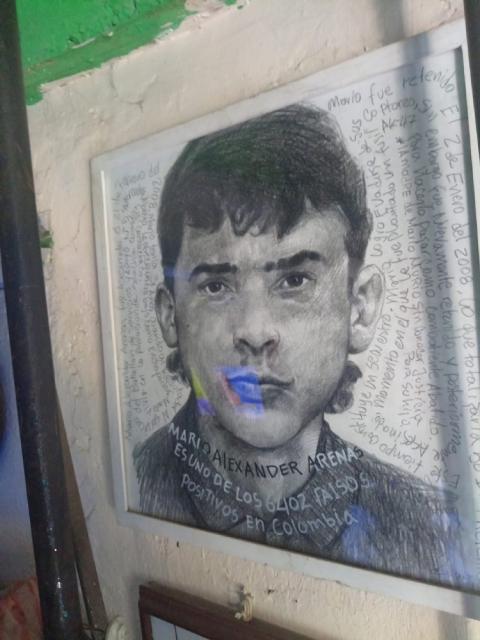
Mario Alejandro Arenas, Cecilia's brother, was one of the approximately 6,402 victims of Colombia's so-called "false positives" scandal in which civilians were killed by the army and falsely presented as guerrillas to inflate combat statistics and obtain incentives from the state. (Courtesy of Cecilia Arenas)
The "false positives" scandal erupted in 2008 when mothers from Soacha, a municipality on the eastern edge of Bogotá, discovered their missing sons in a mass grave hundreds of miles away, dressed in guerrilla fatigues they'd never worn. Military units had been incentivized with bonuses, promotions and vacation days for combat kills, leading to the systematic murder of at least 6,402 civilians between 2002 and 2008, according to Colombia's Special Jurisdiction for Peace. In response to international outcry, Colombia's Truth Commission began working to connect victims' families with perpetrators as part of a broader reconciliation process.
When the military claimed Alex died in combat as a guerrilla fighter, Cecilia knew it was a lie. Alex, who lived with her, remodeled houses in Bogotá, leaving at 5 a.m. and returning at 7 p.m. "When did he have time to become a guerrilla?" she said. "It was impossible."
When officials called her to identify a body in Bucaramanga, they showed her a photograph of Alex in military camouflage with his work clothes visible underneath — a sloppy attempt to disguise the murder. The prosecutor insisted Alex had died in combat carrying 100 weapons and 40 million pesos.
"How could my brother carry 100 weapons?" Cecilia asked. When she pointed out he was wearing his work sweatshirt under the guerrilla uniform in the sweltering heat, the prosecutor had no answer. But her family, terrified of the military's power, accepted the military's story, warning her: "The army is something very big. And you are an ant. They will kill you, and then they'll come back and kill all of us."
But Cecilia had made a promise to her mother to clear her brother's name, and she intended to keep it. She joined with other women survivors and began to demand answers. The Madres de Soacha collective was born, and grew into a force to be reckoned with.
"Las madres no se rinden, carajo," Cecilia said, reciting the Madres de Soacha motto. "The mothers don't give up, dammit." At 56, she has spent 17 years refusing to surrender — not to grief, not to fear, not even to the rage that once consumed her after Alex's murder.
In those days, she'd see a soldier and immediately judge him as guilty. Her youngest son absorbed this hatred, throwing stones and spitting at any soldier who passed their third-floor apartment. The boy was so consumed by vengeance that he eventually enlisted in the military with a secret plan to steal weapons and kill soldiers from within. Fortunately, his computer skills kept him in an office, away from guns.
That's when she realized that something had to change. The transformation began when Fr. Francisco de Roux of the Truth Commission mentioned he was working with military perpetrators. The mothers shocked him with an unexpected request: they wanted to meet their children's killers face to face. And they wanted to learn the truth about what had happened.
"No, no, no, no, viejitas (old ladies), you're crazy," the priest told them. But the mothers persisted. Srs. Trigos, Cano and Norma Bernal supported them. Finally he agreed, and after two years of separate psychological preparation, 19 mothers sat across from the soldiers who had murdered their sons.
"Believe me, it's the hardest thing that can exist in this life," Cecilia said quietly. "Having to hear what expression my brother made when they were going to kill him."
Advertisement
The soldier's answer still haunts her: "No, he was smiling." When Cecilia saw the photograph of Alex's body, she understood. Her mother had taught them never to cry in front of others, never to bow their heads, never to beg. "I think Alex thought, 'Here they're going to kill me,'" she said. "So he smiled."
Through tears and rage, guided by the sisters' steady presence, something shifted. The soldiers began to trust, revealing details about other cases. Mothers who had accepted official lies about their sons dying in combat learned the truth. The work expanded beyond individual healing to collective reckoning.
Cecilia began visiting prisons as part of her healing work, speaking with inmates about forgiveness. She knew prisoners had to complete a "life project" for early release and was skeptical when she met Juan Esteban Muñoz, a soldier who had fled to the United States only to return and confess to 67 murders.
"He said that the dead began to pursue him," she said of why Muñoz had returned to Colombia and turned himself in.
"You're not seeking forgiveness," she told him. "You just want to get out quickly." He explained that yes, he needed to complete the project, but it was necessary so he could work with victims and genuinely ask their forgiveness. Still doubting, Cecilia decided to test him. She had always wanted to skydive as a form of healing: "If what you're saying is true, I want to jump in a parachute with you."
He accepted. In the air, the killer who had executed dozens later told her he had "felt like he was carrying a tray of eggs, terrified of breaking even one, thinking only of his responsibility for my safety."
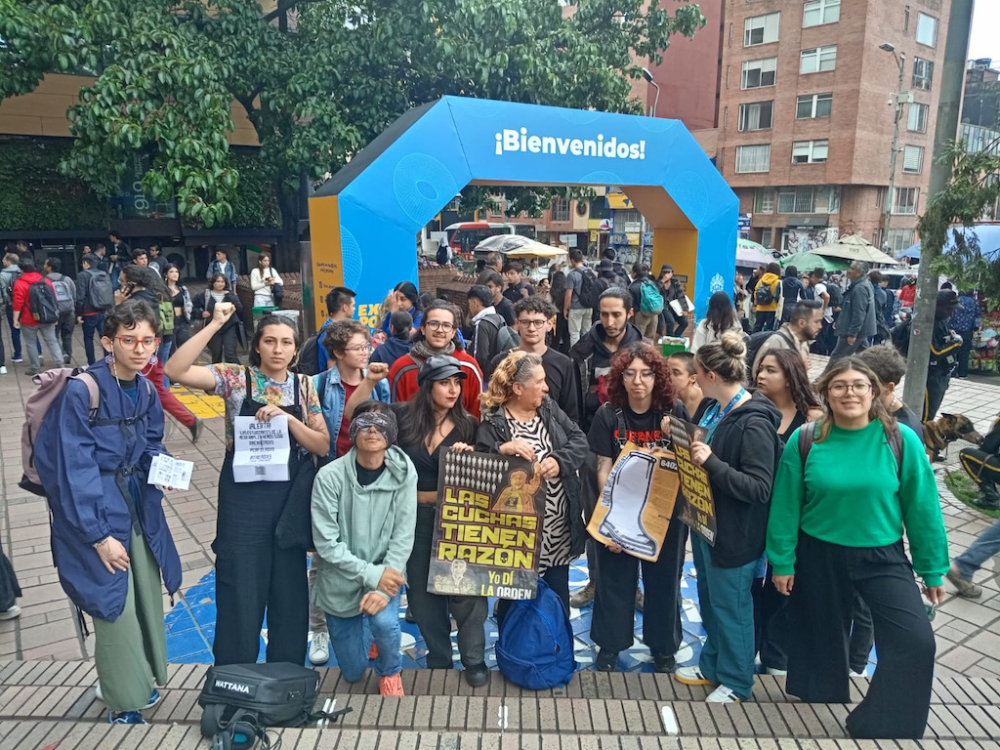
At a gathering held at the Pontifical Javeriana University in Bogotá on November 24, 2024, Cecilia Arenas participated alongside other members of the Hermanas de los Falsos Positivos (Sisters of the False Positives) in a space for reflection and remembrance. (Courtesy of Cecilia Arenas)
This is what transformation looks like in Soacha, where mothers of "false positive" victims have done the unthinkable: embraced their children's killers.
One mother heard her son's last words: "Give me a minute to call my mother and say goodbye." The soldier said no and pulled the trigger. Another mother learned her wounded son asked for water; they shot him in the head instead.
But something started to change in those rooms. The soldiers began confessing not just to the mothers but to other crimes. They came to Soacha's main park to publicly acknowledge what they'd done. And then came the phone calls.
"Forgiveness is possible if it comes from the heart" - Cecilia Jiménez
"One of them called me and said that his mother was sick with cancer and was dying," Cecilia said. The elderly woman begged to know if Cecilia's forgiveness was real, showering her with "thousands and thousands of blessings" before dying eight days later.
Another perpetrator, Rincón Amado, was abandoned by his children when they learned of his crimes. His wife had cancer. Cecilia still calls to check on them.
Trigos, Cano and Bernal offered the spiritual and emotional support to go forward. "When the sisters inject us with that word of love, we go on mending our hearts."
The heart remains wounded, Cecilia acknowledges — "but it's mended now, filled with "a memory based on forgiveness, on conciliation, on reconciliation."
Not all the mothers could make this journey — only four or five of the 19 embraced this radical path, Cecilia said. But those who did achieved something extraordinary. They transformed their agony into a force so powerful it made killers confess, brought them to their knees and, perhaps most remarkably, gave them back their humanity.
"Forgiveness is possible if it comes from the heart," Cecilia insists as children's voices drift in from their rehearsal. In Soacha, where the state once dressed murder in lies, a small group of mothers has undressed violence itself, revealing the broken humans underneath — and somehow, impossibly, choosing to call them back to life.

